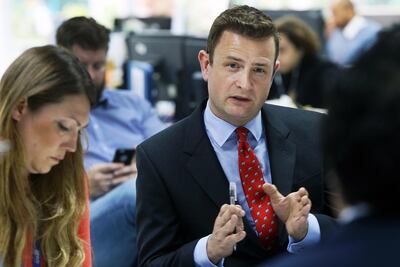Investors who lost hundreds of thousands of dirhams in schemes run by an unlicensed financial adviser have launched a civil case to claim their money back, as more victims came forward claiming they were misled.
The legal action is being pursued in Dubai Civil Court against British consultant Neil Grant and a business he was associated on behalf of at least a dozen expats living in the UAE.
As The National reported in January, the British personal finance consultant was convicted of running his company without a licence by Dubai Criminal Court.
He did not appeal the conviction and has since returned Scotland.
Now Khaled Kalandar of Al Rai Advocates and Legal Consultants lodged the case in court in the name of Amber Waheed, and the next hearing is later this month.
Since The National's article about Grant's conviction, more investors who entrusted him with their savings have come forward to claim they lost most or all of their money in high risk schemes that yielded him high commissions.
British personal trainer Georgina, who asked that her surname not be used, was contacted by Neil Grant more than ten years ago, and was convinced to part with Dh257,000 to invest for her retirement.
“I told him I had to work very hard for my money as every dirham counts,” she said.
“I was earning about Dh80,000 a year so I was keen to be very cautious with a secure investment.
“Grant put my money into a recycling firm he said was an ‘up and coming’ green earth fund and was sure to take off.”
____________
Read more:
Rogue financial adviser convicted by Dubai court in landmark case
New laws will crack down on fraudulent financial advisers
____________
Georgina’s suspicions grew when Grant became elusive. When she finally made contact, she said the Briton told her the investment had plummeted in value and was worthless.
“I didn’t know what to do or who to go to, I had lost a substantial amount of money so going to a lawyer was unaffordable,” she said.
“I had been saving money for years. I can’t get my head around the fact people are doing this all over the world."
One of Grant’s clients claimed he had earned $115,000 (Dh423,000) in commission from a advance savings plans with a pension fund in Britain, with an additional seven years of management fees.
“I thought he was more than our financial adviser, he became a friend over the 10 years or so we knew him, yet all the time it was fake,” she said.
“Grant was just trying to win me over to trust him so he could get his hands on our money.”
Another investor named Warren, an airline pilot living in the UAE, said he sold his house in New Zealand to pump cash into a similar fund sold to him.
He claims to have been mis-sold a high risk product by an insurance broker in 2011 that was licensed to conduct business in the UAE, and has since lost almost all his life savings.
“Our overriding specification was that our capital remained safe,” he said.
“Over the past four years we’ve spent a lot of time in regulators’ offices, trying to get someone to regulate.
“I don’t necessarily think this was malicious, but more a function of the developing environment here. Nobody knows whose fence line is where.
“The costs of court action are effectively prohibitive given the large loss we have suffered.”
Grant did not respond to repeated attempts by The National to contact him in recent months, and his lawyer declined to comment when approached during his court case.
Respected industry figures said an environment in which investors have disposable cash, a lack of understanding of financial matters and the presence of regulatory loopholes has allowed rogue advisers to thrive.

“Expats are putting their financial futures in the hands of unregulated advisors who have little experience or qualifications," said Sam Instone, chief executive of AES International, a chartered financial service provider in the highly-regulated DIFC free zone.
“These people are not financial advisers; they are salespeople.
“Although Grant was unlicensed, there are many IFAs who are licensed and pushing these same plans.
“Grant’s judgment is the first of hundreds of similar cases that have previously failed.”
Grant's customers claimed he put their money in high-risk schemes without their knowledge to earn higher commissions.
Cracks have since appeared in the financial fault-lines of other investment practises, with other clients coming forward after checking the true value of their own pensions.
Mr Instone said many financial advisers are "not qualified, and usually failed car salesmen who rely heavily on commission" who would not be able to work in Europe without qualifications.
The UAE Insurance Authority began a push to clean up how savings and investment schemes were sold in the Emirates in 2016 after the body “noticed an alarming amount of complaints” from policyholders who had seen their gains swallowed by high fees on insurance backed schemes.
A second draft circular from the authority, released in April 2017, reinforced plans to overhaul how the products, distributed to customers via financial advisory firms, are sold to investors.
The Central Bank of the UAE followed suit in May, urging banks and finance companies to resolve all outstanding mis-selling complaints “amicably” and within a deadline of just 90 days.
However, the final form regulations from the IA and the Central Bank are yet to be issued.
Peter Hodgins, a partner in the insurance team at law firm Clyde & Co in Dubai, said he expected the new regulations to be implemented in the first quarter of this year.
"In the meantime, and while firm regulation and reforms are being set up by the authorities, it is important that investors carefully choose the companies and financial advisers they deal with and do their own due diligence, including asking to see their registration and paperwork or licence," he said.


